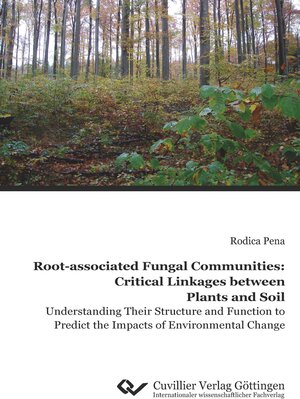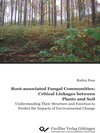Root-associated Fungal Communities: Critical Linkages between Plants and Soil
Understanding Their Structure and Function to Predict the Impacts of Environmental Change
von Rodica Penahttps://cuvillier. de/de/shop/publications/8987-root-associated-fungal-communities-critical-linkages-between-plants-and-soil
This research highlights the vital but often overlooked role of soil fungi in forest ecosystems, focusing on their impact on nutrient cycles, carbon storage, and plant growth. It delves into how these fungi, especially those connected to plant roots, contribute to the overall health and productivity of forests. The study breaks new ground by examining how changes in the environment, influenced by factors like climate change and forest management practices, affect these fungi and the essential services they provide. The investigation is structured into three main parts: exploring the diversity and makeup of root-associated fungal communities, using advanced infrared spectroscopy to uncover new fungal traits, and studying fungi’s roles in carbon cycling and plant nutrition. Utilizing cutting-edge molecular techniques and large ecological databases, the researchers uncover the complex interactions between fungi, their environment, and plant hosts, demonstrating how these relationships are crucial for ecosystem resilience and productivity. Key findings reveal that the diversity and structure of fungal communities are crucial for maintaining forest health, particularly in the face of environmental stressors. The study advocates for forest management strategies that promote fungal diversity to enhance ecosystem services, highlighting the importance of fungi in sustaining forest ecosystems and their potential in mitigating the impacts of climate change. This work sets the stage for future research into the intricate relationships between fungi, forests, and global ecological cycles, emphasizing the need for a deeper understanding of these critical but underappreciated organisms.
This research highlights the vital but often overlooked role of soil fungi in forest ecosystems, focusing on their impact on nutrient cycles, carbon storage, and plant growth. It delves into how these fungi, especially those connected to plant roots, contribute to the overall health and productivity of forests. The study breaks new ground by examining how changes in the environment, influenced by factors like climate change and forest management practices, affect these fungi and the essential services they provide. The investigation is structured into three main parts: exploring the diversity and makeup of root-associated fungal communities, using advanced infrared spectroscopy to uncover new fungal traits, and studying fungi’s roles in carbon cycling and plant nutrition. Utilizing cutting-edge molecular techniques and large ecological databases, the researchers uncover the complex interactions between fungi, their environment, and plant hosts, demonstrating how these relationships are crucial for ecosystem resilience and productivity. Key findings reveal that the diversity and structure of fungal communities are crucial for maintaining forest health, particularly in the face of environmental stressors. The study advocates for forest management strategies that promote fungal diversity to enhance ecosystem services, highlighting the importance of fungi in sustaining forest ecosystems and their potential in mitigating the impacts of climate change. This work sets the stage for future research into the intricate relationships between fungi, forests, and global ecological cycles, emphasizing the need for a deeper understanding of these critical but underappreciated organisms.








